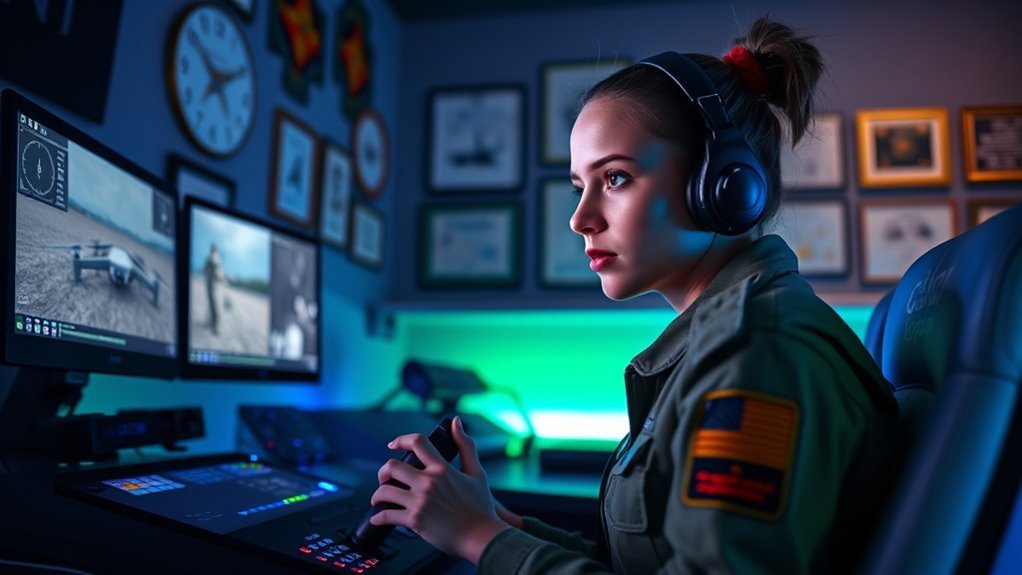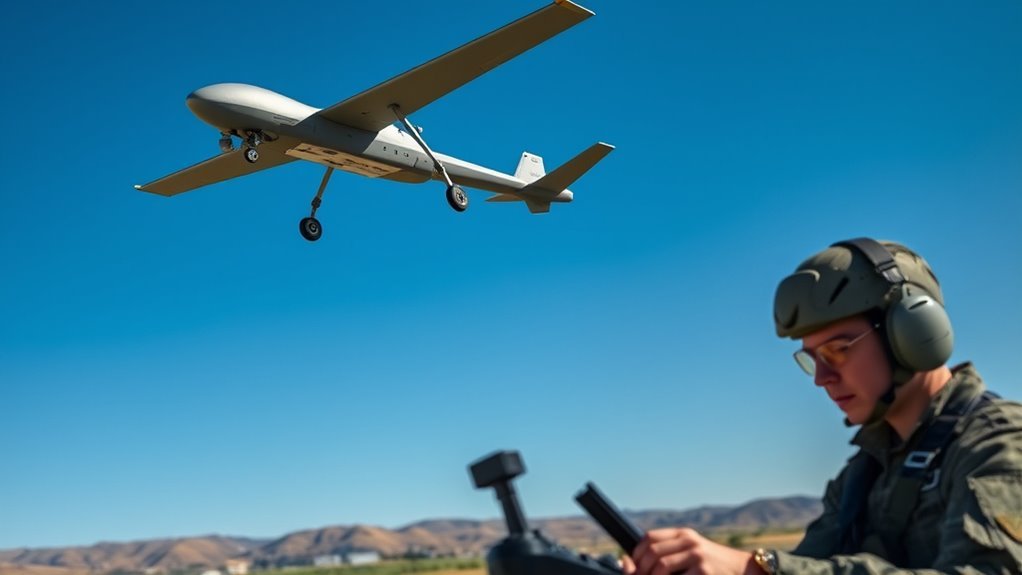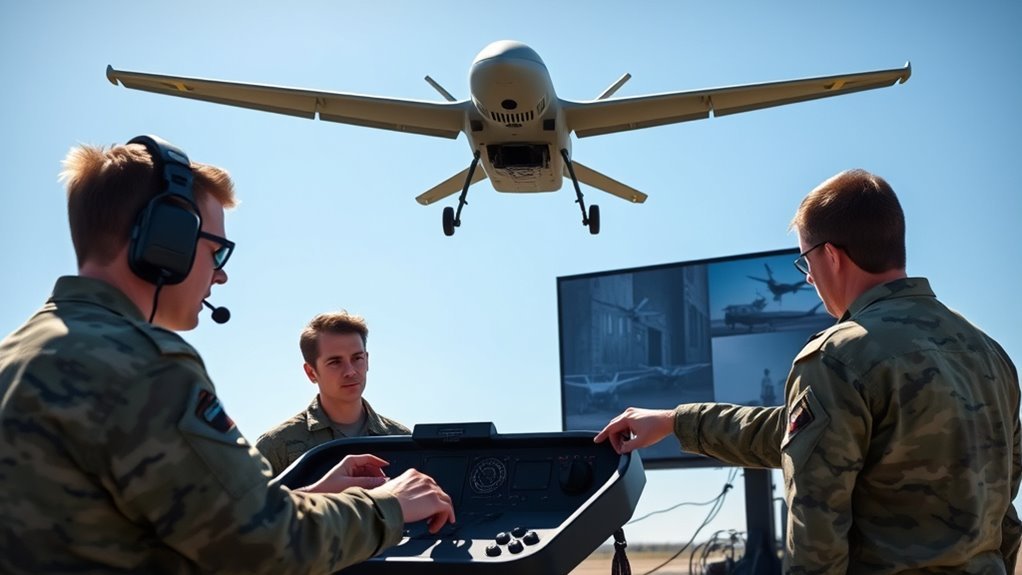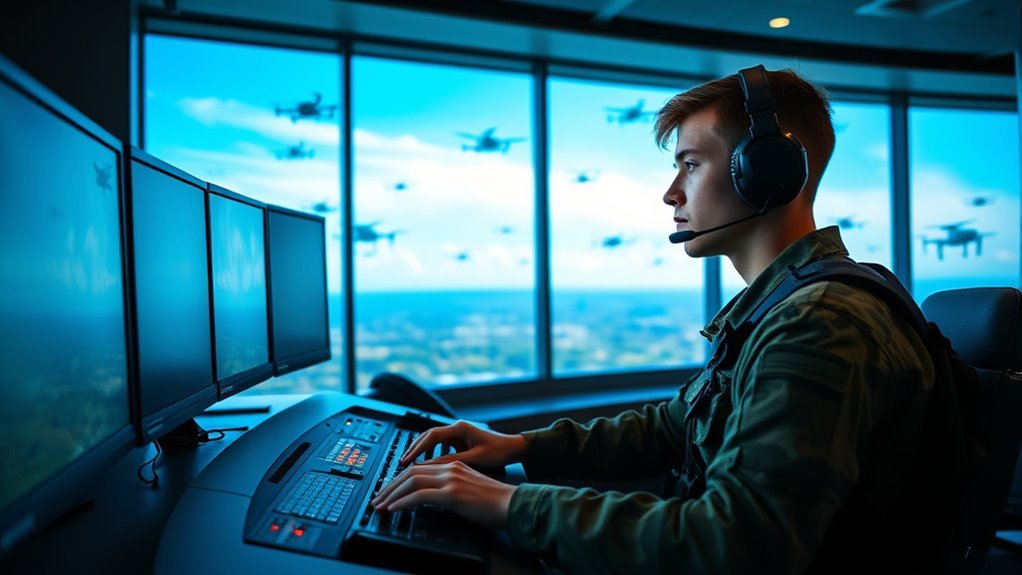To become a military drone pilot, you’ll need a solid foundation in STEM disciplines, particularly in computer science or aerospace engineering. You’ll undergo specialized military training, focusing on drone operations and mission planning. Certification is essential for proficiency, and hands-on practice in simulations is fundamental. Key skills include technical proficiency, problem-solving, and teamwork. Understanding advanced technologies is critical for mission success. Continue on to discover specific pathways and opportunities for advancement in this field.
Understanding the Role of a Military Drone Pilot

As military operations increasingly rely on technology, understanding the role of a military drone pilot becomes essential. In drone operations, your responsibilities extend beyond mere control of the aircraft; you’re tasked with executing missions that require precision and situational awareness. You’ll analyze real-time data, assess threats, and communicate findings to ground forces, ensuring strategic advantages. Your ability to operate advanced sensors and weaponry is vital, as is your understanding of airspace regulations and protocols. Additionally, you must maintain a high level of technical proficiency and adaptability, given the rapid evolution of drone technology. Ultimately, your role embodies the intersection of tactical decision-making and technological expertise, serving the greater mission of securing freedom while minimizing risks to personnel and civilians. Furthermore, the integration of AI-driven algorithms enhances your ability to make informed decisions in dynamic environments. The advanced camera capabilities of military drones enable you to capture critical visual intelligence that aids in mission planning.
Educational Requirements and Background

To become a military drone pilot, you need specific academic qualifications and relevant military training. You’ll also need to develop essential technical skills to operate advanced drone systems effectively. Understanding these educational requirements is vital for advancing your career in this field.
Required Academic Qualifications
Becoming a military drone pilot requires a solid educational foundation, primarily focused on science, technology, engineering, and mathematics (STEM). To pursue this career, you’ll need to explore various academic pathways that align with military requirements. Degree options typically include a bachelor’s in fields like computer science, aerospace engineering, or robotics. These programs equip you with vital analytical skills and technical knowledge essential for operating advanced drone systems. Additionally, courses in data analysis and programming are highly beneficial. A strong academic background not only enhances your understanding of drone technology but also prepares you for future military training. Ultimately, a well-rounded education in STEM is important for achieving your goal of becoming a military drone pilot.
Relevant Military Training
After completing the necessary academic qualifications, the next step involves specialized military training tailored for drone operations. This training is essential for understanding advanced drone technology and its applications in tactical operations. You’ll engage in rigorous coursework that covers drone systems, mission planning, and operational tactics. Expect hands-on simulations that emulate real-world scenarios, enhancing your ability to make quick, informed decisions under pressure. Additionally, you’ll learn about airspace regulations and the ethical implications of drone warfare, preparing you for the responsibilities that come with the role. Mastery of these elements is critical, as effective drone pilots must integrate technical knowledge with strategic thinking to guarantee mission success and operational freedom in complex environments.
Technical Skills Development
While a strong academic foundation is essential, developing specific technical skills is equally important for aspiring military drone pilots. You’ll need to achieve technical proficiency in operating various drone systems and familiarize yourself with their mechanics. This includes mastering the controls, navigation systems, and communication protocols. Additionally, software knowledge is vital; understanding the platforms used for mission planning, data analysis, and real-time operations will set you apart. Proficiency in programming languages, data processing tools, and simulation software is highly beneficial. Pursuing relevant courses in avionics, robotics, and IT can enhance your skill set. Ultimately, your ability to seamlessly integrate these technical skills into operational scenarios will define your success in this dynamic field.
Military Training Programs for Drone Operations

As military operations increasingly rely on unmanned aerial systems, the importance of specialized training programs for drone pilots cannot be overstated. These programs focus on advanced drone operation techniques, equipping you with the skills necessary for effective mission execution. Your training will likely include flight simulation training, which allows you to practice in a controlled environment, honing your decision-making under pressure. You’ll learn to navigate complex scenarios, understand drone mechanics, and analyze real-time data. Additionally, these programs emphasize teamwork, ensuring you can operate seamlessly within a unit. As you progress, expect to engage with the latest technology and tactics, solidifying your role as a capable and adaptive drone pilot in military operations.
Certification and Licensing for UAV Pilots
To operate a military drone, you’ll need to understand the certification and licensing requirements specific to UAV pilots. This includes compliance with FAA regulations and completing necessary training programs. Familiarizing yourself with these components is essential for ensuring you meet operational standards and legal guidelines.
Required Certifications Overview
Becoming a military drone pilot requires a clear understanding of the certifications and licenses necessary for operating unmanned aerial vehicles (UAVs). You’ll need to navigate the certification process, which typically includes completing specific training requirements tailored to military operations. This often involves extensive coursework in UAV systems, flight operations, and mission planning. Additionally, practical flight training is essential to guarantee proficiency in real-world scenarios. Depending on your role, advanced certifications may also be required, focusing on specialized skills like intelligence gathering or combat operations. It’s important to stay informed about evolving standards within the military to maintain compliance and enhance your capabilities as a pilot. Embrace the freedom that comes with mastering these essential qualifications.
FAA Regulations Compliance
Understanding the importance of FAA regulations is vital for any aspiring military drone pilot. These regulations govern the operation of Unmanned Aerial Vehicles (UAVs), guaranteeing safety and compliance within national airspace. You’ll need to familiarize yourself with the specific compliance guidelines set forth by the FAA, which include obtaining a Remote Pilot Certificate. This certification demonstrates your understanding of airspace classifications, weather effects, and UAV operations. Additionally, you must adhere to operational limits, such as altitude and distance, as outlined in the regulations. Staying updated on any changes to FAA regulations is essential, as non-compliance can lead to legal repercussions and jeopardize your career. Embracing these standards not only guarantees safety but also preserves the freedom to operate UAVs responsibly.
Training Programs Available
Numerous training programs are available for individuals seeking certification and licensing as UAV pilots in the military sector. Emphasizing drone technology and pilot training, these programs equip you with essential skills. Here are key components you’ll encounter:
- Ground School: Learn the theoretical aspects of UAV operations, including regulations and aerodynamics.
- Simulated Flight Training: Gain experience in controlled environments, honing your piloting skills with advanced simulators.
- Hands-On Flight Training: Participate in real-world missions, operating various UAV models under supervision.
- Certification Exams: Demonstrate your knowledge and skills through rigorous assessments, securing your credentials.
With dedication and perseverance, you’ll master the art of UAV piloting and embrace the freedom that comes with it.
Skills and Attributes for Success in the Field
Success as a military drone pilot hinges on a unique blend of technical skills and personal attributes. You’ll need strong problem-solving abilities and analytical thinking to navigate complex situations effectively. Adaptability and attention to detail are also essential, as you’ll face rapidly changing environments and critical decision-making scenarios. Advanced technologies like AI-driven autonomy enhance operational efficiency, making proficiency in these areas even more vital. Furthermore, understanding AI-enhanced obstacle avoidance can significantly improve flight safety during missions.
| Skill/Attribute | Importance | Application |
|---|---|---|
| Technical Proficiency | High | Operating and troubleshooting drones |
| Problem-Solving Abilities | Important | Responding to unexpected challenges |
| Analytical Thinking | critical | Interpreting data and mission outcomes |
| Communication Skills | Important | Collaborating with team members |
| Stress Management | crucial | Maintaining focus under pressure |
Mastering these skills will enhance your effectiveness and guarantee mission success in the field.
Career Advancement Opportunities in Military Aviation
Career advancement in military aviation offers a structured path filled with opportunities for those dedicated to their craft. As you navigate your career pathways, consider the following avenues for growth:
- Specialized Training: Engage in advanced training programs to enhance your technical skills.
- Certification Programs: Obtain certifications that validate your expertise and increase your marketability.
- Mentorship Opportunities: Seek mentorship from seasoned professionals to gain insights and guidance.
- Leadership Roles: Pursue positions that allow you to lead teams, fostering your ability to influence and inspire.
Frequently Asked Questions
What Is the Average Salary of a Military Drone Pilot?
The average salary for a military drone pilot varies but typically ranges from $70,000 to $100,000 annually. Besides competitive pay, you’ll enjoy drone pilot benefits and military career advancement opportunities that enhance your professional growth.
Are There Physical Fitness Requirements for Drone Pilots?
Imagine a bird soaring high; even drone pilots must meet physical assessment standards. While you won’t need to run marathons, maintaining certain fitness standards guarantees you’re ready for the demands of precision flying and quick decision-making.
Can Female Candidates Pursue This Career Path?
Yes, female candidates can pursue this career path. With growing gender equality in military roles, there’re expanding career opportunities for women in drone operations, allowing you to contribute markedly while enjoying professional freedom and advancement.
What Types of Drones Do Military Pilots Operate?
They say knowledge is power, and in military aviation, it’s essential. You’ll operate reconnaissance drones for surveillance and intelligence, as well as combat drones designed for direct engagement, each serving distinct but significant roles in operations.
How Often Do Drone Pilots Deploy on Missions?
Mission frequency for drone pilots varies, but deployments typically range from several days to weeks. You’ll often find yourself balancing operational demands with deployment duration, ensuring effective support while maintaining personal and team readiness throughout.

